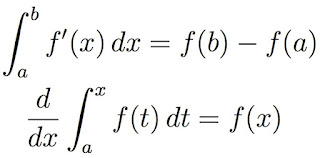Fundamental Theorem of Calculus, from Math 121 Clark Univ.
[Feynman] "Do you know calculus?"
[Wouk] "I admitted that I didn't"
[Feynman] "You had better learn it...It's the language God talks."
Herman Wouk, converstion with Richard Feynman in The Language God Talks, p.5
"What is your number?" My grandson, Gabriel (age 2), on meeting someone.
"If you ask how such things can occur, seek the answer in God’s grace, not in doctrine; in the longing of the will, not in the understanding; in the sighs of prayer, not in research; seek the bridegroom not the teacher; God and not man " St. Bonaventure, The Journey of the Mind to God.
IS REALITY ALTOGETHER MATHEMATICAL?
In his very fine book, Is God a Mathematician?, Mario Livio gives a good history of mathematics and its foundational applications to science. He also discusses whether mathematics is a Platonic ideal or is a construction of the human mind--i.e. is mathematics "discovered" or "invented"? But he does not address the question posed in his title, which I propose to do in this post. I'll also discuss some related arguments by physicists and philosophers that reality is mathematics (see references).Now it goes without saying (although I will say it), that if God is omniscient, he knows everything and therefore, perforce, must know all mathematics. These propositions do not, however, require that reality is altogether mathematical, as suggested by Max Tegmark in his book, Our Mathematical Universe. If reality is altogether mathematical, then everything can be quantified, represented by numbers or properties that can put into correspondence with numbers. Is this so?
I invite the reader to suggest things that cannot be quantified by numbers. Here's my list of a few such:
- self-awareness, consciousness ("Cogito, ergo sum")
- moments of communion with God, The Holy Spirit, Jesus
- love of another
- shame
- anger
- pain
- happiness
- joy
- feelings aroused by nature
- feelings aroused by music
- feelings aroused by intellectual discovery
- the literary excellence of a poem, a short story, a novel
- boredom on reading blog posts dealing with the reality of mathematics
- etc...
Now psychologists might say that most, if not all of the above can be quantified: just use the simple 1-5 scale as, in satisfaction response surveys. I claim that, unlike measuring the mass of a steel ball or its radius, such a procedure would not yield a universal measurement--one person's "2" might well be another person's "4". The qualia referred to in the above items are non-quantifiable, in the sense that a universally applicable measurement cannot be applied.
Let's explore just one of the above in more detail--feelings aroused by music. In another post, God's Gift to Man--the Transforming Power of Music, I've discussed the emotional and spiritual impact music has had on me, an effect which cannot be explained by mathematical relationships. The Pythagorean harmonies have no place in the dissonances of Bartok, Berlioz or even Mozart (Symphony #40, the Great G-Minor) .
The inability of computation--mathematics--to emulate musical creativity is illustrated in a science-fiction story by James Blish, "A Work of Art". In this tale "mind sculptors" of the future install a recreation of Richard Strauss in a non-musical volunteer. The volunteer thinks of himself as a resurrected Strauss, composes an opera, and then realizes it uses old musical devices and is not creative. At the concert in which the work is premiered, the volunteer knows that the resounding applause is for the mind sculptors, not for his musical work.
The inability of computation--mathematics--to emulate musical creativity is illustrated in a science-fiction story by James Blish, "A Work of Art". In this tale "mind sculptors" of the future install a recreation of Richard Strauss in a non-musical volunteer. The volunteer thinks of himself as a resurrected Strauss, composes an opera, and then realizes it uses old musical devices and is not creative. At the concert in which the work is premiered, the volunteer knows that the resounding applause is for the mind sculptors, not for his musical work.
I AM NOT A NUMBER!" (Number 6, in "The Prisoner")
Let's turn to consciousness/self-awareness as an attribute of mathematical reality. Is the brain a "meat computer"--can consciousness/self-awareness be programmed? In other words, does the self-aware brain operate by algorithms?
The eminent mathematical physicist, Roger Penrose, has said no to this proposition in three books: "The Emperor's New Mind", "Shadows of the Mind", and "The Large, the Small, and Human Consciousness". Penrose demonstrates, using Godel's Incompleteness Theorem and Turing's Halting Theorem, that the human can know the truth of a mathematical theorem even when a computer can not.
In "Shadows of the Mind" he gives four types of belief or non-belief in the possibility of Artificial Intelligence (AI), that self-aware intelligence can be programmed by some set of algorithms:
- Consciousness is reducible to computation (the view of strong-AI proponents);
- Consciousness can be simulated by a computer, but the simulation couldn't produce "real understanding" (John Searle's view);
- Consciousness can't even be simulated by computer, but nevertheless has a scientific explanation (Penrose's own view)
- Consciousness doesn't have a scientific explanation at all (the view of Thomas Nagel--see Mind and Cosmos)
Penrose is looking to a theory of quantum gravity to explain consciousness, The philosopher John Searle posits, as does Penrose, that consciousness has a scientific explanation , but that it will be an explanation in which consciousness is an "emergent" property of the brain's biochemistry and biophysics, much as wetness can be explained by theories of surface tension for water. I have discussed Nagel's views (with links to other discussions) in the post which is linked to above.
A quantum computer (i.e. a scientist engaged in quantum computation), Scott Aaronson, has given an amusing and almost-convincing critique of Penrose's thesis in one of his Physics Lectures. Some of his criticisms can be answered, particularly the one dealing with the Libet experiment, but I don't propose to engage that discussion here. The critique relies primarily on two features: the activities of the mind are finite, not infinite; a computer which would be allowed to make mistakes would not be bound by Goedel's Theorem.
Finally, note that Max Tegmark does not show in "Our Mathematical Universe" how consciousness can be explained as a mathematical phenomenon. He claims that this will be done in the future, but that seems to me very much like a scientism of the gaps.
IS MATHEMATICS QUASI-EMPIRICAL?
If mathematics (maybe I should upper-case that?) is to be the end-all and be-all of what is, then it seems reasonable to suppose that mathematics is complete in itself--there are no loose ends. A primitive view of Goedel's and Turing's theorems suggest that this is not so. The computer philosopher Gregory Chaitin reinforces this opinion in his books "The Limits of Mathematics" and "The Unknowable":"What I think it all means is that mathematic is different from physics, but it's not that different. I think that math is quasi-empirical. It's different from physics, but it's more a matter of degree than an all or nothing difference. I don't think mathematicians have a direct pipeline to God's thoughts, to absolute truth, while physics must always remain tentative and subject to revision [emphasis added]. Yes math is less tentative than physics, but they're both in the same boat, because they're both human activities, and to err is human." Gregory Chaitin, The Unknowable, pp 26-27
MY TAKE
I view mathematics, logic, reason as the foundations and the framework of the building in which we live. There are essential additions--faith, religion, beauty, love, ...--which are non-mathematical and above the bounds of logic. As Pope St. John Paul II, said.
"Faith and reason are like two wings on which the human spirit rises to the contemplation of truth; and God has placed in the human heart a desire to know the truth—in a word, to know himself—so that, by knowing and loving God, men and women may also come to the fullness of truth about themselves" Pope St. John Paul II, Fides et Ratio.So my answer to the question in the title is, God is much more than a mathematician.
*I've gone back to my Jewish roots, inverted the title of a very good book, "Is God a Mathematician?" by Mario Livio, to make it a declarative sentence in form, but still a question (imagine a rising inflection at the end, as with a Yiddish or Pennsylvania Dutch accent); I've put one of the few Yiddish phrases I remember at the end. If you don't know what "oy vey" means, I'll have to ask "what planet are you from?"
REFERENCES
Mario Livio, Is God a Mathematician?
Roger Penrose, The Large, the Small and Human Consciousness
John Searle, Minds, Brains and Programs.
Max Tegmark, Our Mathematical Universe.
Herman Wouk, The Language God Talks.




